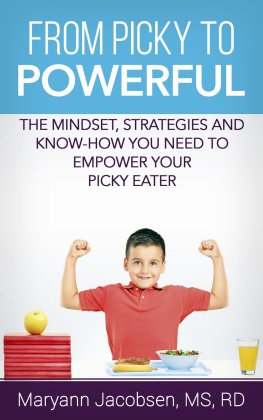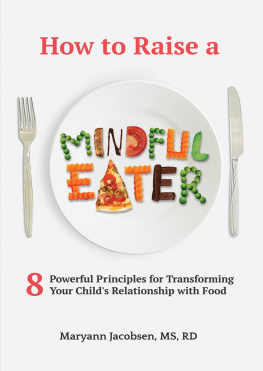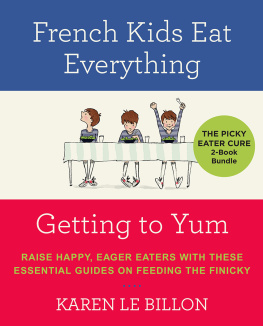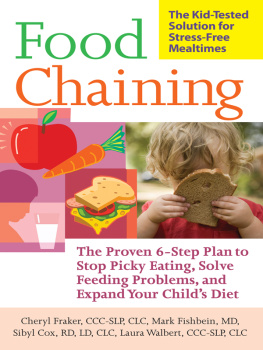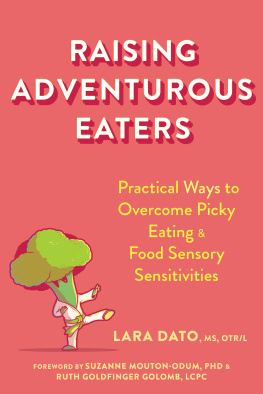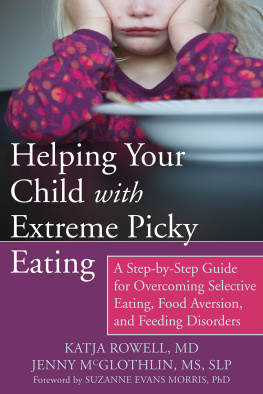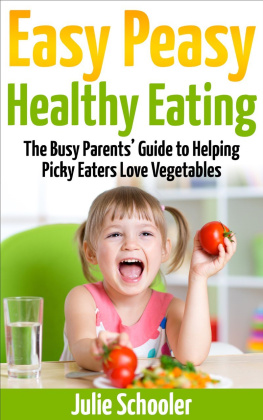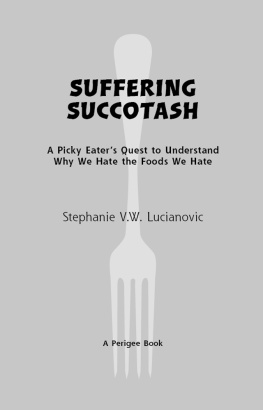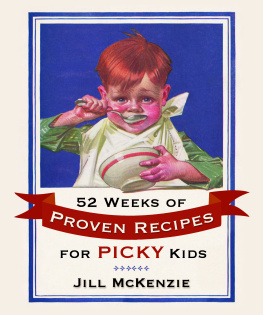FROM PICKY TO POWERFUL
The Mindset, Strategies and Know-How You Need to Empower Your Picky Eater
Maryann Jacobsen, MS, RD
Copyright 2014, 2016 Maryann Jacobsen
All rights reserved. This book or any portion thereof
may not be reproduced or used in any manner whatsoever
without the express written permission of the publisher
except for the use of brief quotations in a book review.
Second Edition
Published by RMI Books
San Diego, California
www.MaryannJacobsen.com/RMIBooks

DEDICATION
This book is dedicated to my blog readers. Every time I wrote about picky eating you responded. Thus, a book was born.
CONTENTS
Introduction: From Guilt to Gained Perspective
S TEPHANIE FED HER BABY a laundry list of foods to expose him to a wide variety of flavors at an early age: avocado, beets, lentils, barley, etc. She made almost all of her baby food, starting with veggies and adding sweet fruits later. Now he is two and would prefer to live off Dino nuggets and French fries. If I had to sum it all up, I think we are disappointed that we did everything textbook from the beginning and ended up with the same results as though we hadnt put in any effort, she said. He wont eat veggies unless its a potato, and he prefers to consume calories only at breakfast and snacks with maybe a few bites of lunch or dinner.
I hear this from parents all the time. They offered their children a variety of wholesome foods when they were babies, and the kids gobbled every bit of it up. But around the age of two (sometimes earlier, sometimes later), eating habits take a turn and parents are frustrated. This frustration turns to guilt as many think, What am I doing wrong?
The problem is not your childs eating; its that you werent prepared for this inevitable stage in his food journey. Youve been told if you do everything right, employ certain strategies, and manipulate food variety, picky eating can be prevented. This not only adds to the needless guilt you feel, its flat-out wrong.
Although you undoubtedly help shape your childs eating over the course of her childhood, there are real scientific reasons kids become more selective with food at toddlerhood (discussed in detail in Chapter 1). Picky eating is a mix of normal development, fluctuations in appetite, genetics, individual eating style, temperament, and yes, how and what is being served.
But I think the most hurtful message of all is that picky eating is a parents fault, that something you did or didnt do was wrong, and other parents with kids who eat everything somehow got it right. Did you know that Michael Pollan, best-selling author and popular foodie, has a very picky son? And that many dietitians and chefs complain about feeding their picky kids? According to one study, nearly half of children are picky at some point during early childhood.1
Im here to tell you that picky eating is not only not your fault, it can be a rewarding experience if you change your perspective. In the groundbreaking book, Raising Your Spirited Child, Mary Sheedy Kurcinka helps parents view what society labels as difficult children in a positive light.2 Many of the traits of the spirited child, like determination, are qualities that are an asset in adulthood; the secret is learning how to manage these strong personalities during childhood. The same holds true for picky eating.
Lets look at the positive aspects of picky eating for a moment. Who was more likely to survive in hunter-gatherer times when there were toxic plants around? Would it be the child afraid to eat unfamiliar food or the child who eats anything? Of course, it was the cautious kid. And what adult wouldnt benefit from eating small amounts at dinner if they simply werent hungry? Picky kids dont eat more food when they are not hungry just because its there. Thats good, right? And kids arent just picky about meals; theyre picky about sweets, too. There are numerous beneficial qualities of picky eaters, many of which may not be revealed until later in life.
Did you know your picky eater may make an excellent cook someday? Thats because his now-sensitive taste buds can blossom into a discerning palate. In an interview on Food Republic, Michael Voltaggio, who runs one of the hottest restaurants in Los Angeles, admits to being a picky eater during childhood. When asked what he ate at age twelve, he answered, Ramen, and grilled cheese sandwiches, and hot dogs, and chicken fingers, and the stuff that everybody else was eating. My mom actually cooked really great mom food, though. With pork chops and all that kind of stuff, she did an amazing job. I was just picky.3
Unfortunately, parents are repeatedly told picky eating is bad, which creates an endless cycle. A child becomes selective. Parents panic and attempt to get their child to eat a certain way. The child resists. This makes picky eating even more of an issue and mealtimes more stressful, hampering the childs ability to learn and grow with food.
If this sounds familiar, you can change it. The very first step in setting yourself free from the picky-eating cycle is transforming the way you view it.
THE PICKY EATING PROBLEM PROBLEM
I N THE 1960S, TWO EDUCATION professionals, Rosenthal and Jacobson, carried out a study in elementary school classrooms to observe the experimenter expectancy effect.4 Applied to the classroom, they examined how teachers expectations affect student achievement. The kids were given an intelligence test, and 20 percent were chosen randomly. The teachers were then told this group of students had unusual potential for intellectual growth and were expected to do very well by the end of the year. Eight months later, they retested the students. Those that were labeled as having more potential had significantly higher test scores than the other kids not described this way.
Just viewing the average kids potential for intelligence in a more positive light changed how the teachers treated the children. This resulted in children who did better in school compared to those viewed as less apt to learn.
Every single day this expectancy effect is in play with children and eating. When children become selective, the picky eating label replaces the good eater one. Even when children arent told they are picky, caregivers send this message with their feeding approach: pushing, pressuring, and making special meals.
Next page
